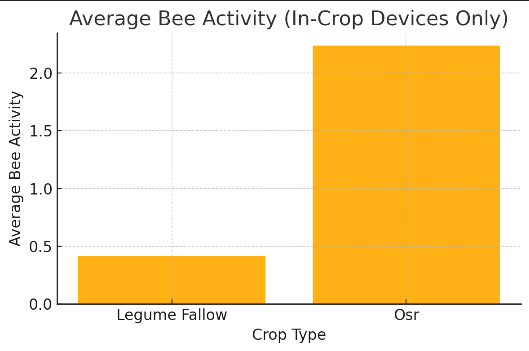
How Oilseed Rape Can Close the Early Hunger Gap
Over the past decade, the UK has seen a significant decline in the area planted with oilseed rape (OSR), down by nearly 60% from its peak. Once a vibrant yellow signal of spring and a vital part of many arable rotations, OSR has faced challenges from pest pressure, notably cabbage stem flea beetle, and rising input costs. But its decline has had consequences beyond farm profitability.
The early spring flowering of OSR plays a critical ecological role. It provides one of the most important melliferous resources in the agricultural landscape, yielding nectar and pollen just as pollinators emerge from hibernation during the spring “hunger gap”. This loss of habitat and forage has contributed to a worrying decline in pollinator numbers, with knock-on effects for biodiversity, crop yields, and the viability of commercial beekeeping and pollination services. In response, the OSR Reboot campaign, supported by the British Bee Keepers Association and the Bee Farmers Association, was launched to restore confidence in the crop and realign its role in sustainable agriculture.
"Oilseed rape is one of the few large-scale crops that delivers significant early forage for our bees. Without it, we face a significant shortage both in early-season nutrition for our colonies coming out of winter and a reduced spring honey crop," says Paul Barton, Bee Farmers Association. "Bringing OSR back into rotations isn’t just good for farmers—it’s a massive boost for the UK honeybee population and British honey production."
Now, United Oilseeds, in partnership with agri-tech innovator AgriSound, is taking the next step. Together they’ve launched a pilot project across six member farms in southern England to quantify and communicate the real-world biodiversity benefits of OSR.
Listening to the Land: The AgriSound Pilot
Using 54 cutting-edge audio monitoring devices, AgriSound’s technology captures real-time pollinator activity across fields of OSR, legume fallow, and cereals. These devices also monitor environmental factors like temperature, humidity, and light, helping build a full picture of what influences pollinator behaviour and presence.
The early findings are striking - pollinator activity in OSR fields is already around five times higher than in legume fallow, a clear demonstration of OSR’s value to bees at a critical time in the season. This initial data also reinforces OSR’s role as a vital melliferous crop that supports pollinator populations when few other floral resources are available.
This insight backs up academic research showing the mutual benefit of OSR-pollinator interactions. Each hectare of flowering OSR produces between 25 and 91 million flowers and more than 50 litres of nectar, while just two bee colonies per hectare can increase OSR yields by 15–20%, improve pod uniformity, and enhance germination in seed crops (Sabbahi, 2005).
Policy Implications: Aligning Incentives with Outcomes
As the Sustainable Farming Incentive (SFI) evolves, this evidence presents a unique opportunity to integrate pollinator-supporting arable crops like OSR more directly into environmental land management schemes.
Legume fallows and wildflower mixes undoubtedly have their place, but they often flower too late to support bees during the critical early spring period. A diverse landscape needs a succession of foraging opportunities throughout the season, and OSR provides precisely that, bridging the hunger gap between winter and summer.
A Call to Action
We urge policymakers shaping the future of the SFI to:
- Recognise the value of early-season melliferous crops like OSR in providing essential forage for bees and other pollinators.
- Support on-farm monitoring technologies, such as those deployed by AgriSound, to provide data-driven biodiversity metrics.
- Incentivise the cultivation of pollinator-beneficial crops in rotation, including OSR, peas, beans, and linseed, especially where there is proven mutual benefit to both farm productivity and biodiversity.
Rebuilding OSR is not just about yield, it's about supporting bees, biodiversity, and a more balanced farming system. This pilot project demonstrates that with the right tools and the right vision, OSR can once again play a central role in sustainable British agriculture while supporting bees and pollinators across the UK.
